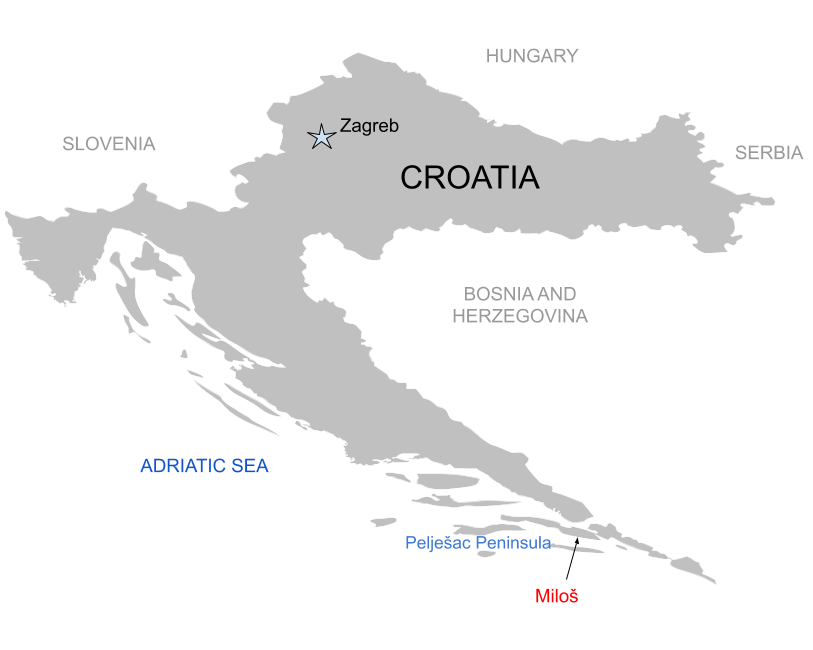2016 Miloš Plavac
Pelješac Peninsula, Croatia

A man can truly reaffirm himself in his surroundings bycontinuously evolving and trying to create a better and nicer world.” - Frano Miloš, - A short drive from the idyllic Adriatic oystering village of Mali Ston is the home Frano’s family has lived and made wine in for over 500 years. Less than a mile away his prized vineyards stretch from Uvala Prapratno (Prapratno cove) overlooking the village of Ponikve. Nowhere in Europe is there such a concentration of coastal vineyards. This proximity to the sea lends the wines their distinctive note of Friškina. This “scent of the sea” makes the rugged often full bodied reds of the Pelješac Peninsula unexpectedly delicious with certain seafoods, even oysters as it is sometimes paired with locally. Plavac Mali (little blue) reigns in Pelješac, and the region is planted nearly exclusively to it. As the progeny of the ancient variety Crljenak Kaštelanski (AKA Zinfandel) it has the genetics to not just withstand the intense coastal summer, but thrive. Compeled by something more artistic than comercial in his wine making, Frano works only with Plavac from his own vines. His wines both clearly reflect his unique sense of aesthetic while also capturing the essence of their place.
VINEYARDS
The vineyards are extremely difficult to farm; steep 45 degrees slopes of ragged head pruned Plavac planted in pure dolomitic limestone. Handmade stone terraces and walls give the vineyards an architectural look that bring to mind a Japanese garden. According to Frano, “To experience, adapt to, and change to such an environment enables a person to understand the exterior climactic influences: the sun, the warmth, the light, the air circulation, the types and the amounts of the rainfall, accumulation of humidity in the soil and in the air. Plavac mali is a tie which puts all of these characteristics together and creates harmony; a very complex one.” Due to the extremely favorable conditions there is no need to spray for pests, however in May and June copper and sulfur are often applied. Frano believes that green harvesting unnecessarily traumatizes the vines during a critical point in their growth so vines are heavily pruned in the winter.
WINE MAKING
Frano’s children already have their hands in the vineyards, in the cellar, and on the marketing. Hard work and intuition gives the best results. Only autochthonous yeasts is used for fermentation, and from start to finish all wine lives in Slavonian oak barrels, never new. Vinification is oxidative which ultimately enhances the wines ability to age. All wines are unfiltered and only see added sulfur at bottling.
NOTES & PAIRINGS
Longevity is synonymous with the Miloš name. Collectors of his wines are still enjoying the youthful 94’ Plavac. According to Frano Miloš, “This wine is a pure reflection of variety and terroir from which it comes. It is typical for the Pelješac peninsula and our style of wine. It has a very thick aromatic profile with dark fruit, minerals, herbal notes with sage domination. Deep and slow to open. The flavor is rich and concentrated, balanced with soft natural tannins. Elegant and long living.” To that could be added that Miloš Plavac displays a distinctive note of black tea on the nose, and on the palate a savory saltiness that make it spectacular with a wide range of cuisine. From Korean banchan to fresh grilled sardines.
ANALYTICS & PRONUNCIATION
PRODUCER: Miloš (Mee-loash)
APPELLATION: Pelješac Peninsula (Pel-yah-shatz)
VINTAGE: 2016
GRAPE COMPOSITION: 100% Plavac Mali (Plah-vatz Molly)
CLIMATE: Mediterranean
SOILS: Sandy soil on dolomite rocks - limestone.
MACERATION & AGING: 2 years in large Slavonian oak barrels, never new.
ALCOHOL: 13%
RESIDUAL SUGAR: 1.2 g/l
ACIDITY: 5.8 g/l
